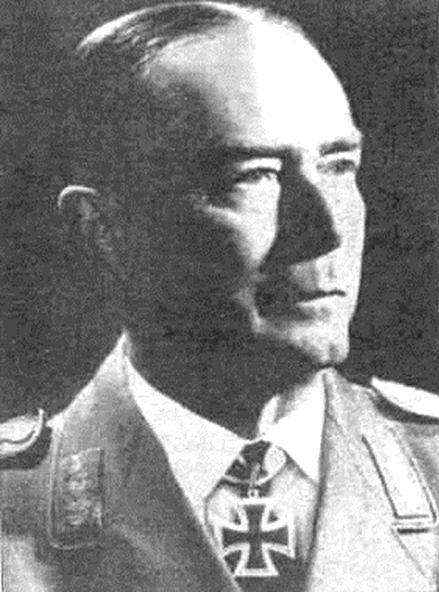Main Menu

Gerhard Matzky
* 19. März 1894, Küstrin an der Oder
† 9. Juni 1983, Bad Godesberg
 Gerhard Matzky became a cadet in the Imperial Prussian Army after graduating from high school in Wroclaw on 26 March, serving in the 4th Oberschlesisches Infantry Regiment Nr. 63 in Oppeln. Matzky was the son of an officer and was accepted into Kriegsschule (Military Academy) in Niesse, graduating on August 18 1913. After a command as a teaching officer at the NCO School in Treptow, he went into combat with I.R. 63 from the opening stages throughout the war, serving on the Eastern and Western fronts as a platoon leader, company commander and operations officer. He would be awarded the Iron Cross II Class and in 1915 he earned the Iron Cross I Class and on 5 October 1916 he was promoted to Oberleutnant (lieutenant). He was wounded several times during the war, receiving not only the Wound Badge in black, but in Silver as well.
Gerhard Matzky became a cadet in the Imperial Prussian Army after graduating from high school in Wroclaw on 26 March, serving in the 4th Oberschlesisches Infantry Regiment Nr. 63 in Oppeln. Matzky was the son of an officer and was accepted into Kriegsschule (Military Academy) in Niesse, graduating on August 18 1913. After a command as a teaching officer at the NCO School in Treptow, he went into combat with I.R. 63 from the opening stages throughout the war, serving on the Eastern and Western fronts as a platoon leader, company commander and operations officer. He would be awarded the Iron Cross II Class and in 1915 he earned the Iron Cross I Class and on 5 October 1916 he was promoted to Oberleutnant (lieutenant). He was wounded several times during the war, receiving not only the Wound Badge in black, but in Silver as well.
After the end of the war, he served in the Border Guard Service in the east of Silesia, until he returns in the army as Oberleutnant. Matzky in early 1920, is transferred to the transition army of the Reichswehr to 15th Infantry Regiment and later in the 7th Infantry Regiment. The 1st October 1921, he was transferred as a squadron officer in the 4th Cavalry Regiment in Potsdam. In November 1923, Matzky was promoted to the rank of Hauptmann and transferred in 1924 to the 4th battery of the 4th artillery regiment in Bautzen. From 1924 to 1927, he was then a member of the staff of the Command Group 2 in Kassel. In 1928, he was appointed to the Ministry of Defense in Berlin and later he was involved in the negotiations on disarmament Geneva. Matzky is then transferred to the headquarters of the regiment 3te Rathenow Cavalry Regiment and in October 1930 he was commander of the 3 th company of the 2th Infantry Regiment Ortelsburg. In this use, he was promoted to Major in 1932, and it is repeatedly called the Ministry of Defense. In April 1934, he was transferred as first officer of the General Staff at the 7th Division of the Reichswehr in Munich. In October 1934 he was promoted to Oberstleutnant. In spring 1935, he was appointed first officer of General Staff of the VIIth Corps in Munich in October 1936, first officer of the General Staff of the Command Group 1 in Berlin. There, he was promoted to the rank of Oberst in April 1937.
From 1938 to the end of 1940, Matzky is attached to the German Embassy in Tokyo. In January 1941 he became an officer of the General Staff of the army and was promoted to the rank of Generalmajor in April 1941. In November 1942 he was transferred to the reserve and in January 1943 he was commander of the 21st Infantry Division. There he was promoted to 20 April 1943 at the rank of Generalleutnant. In March 1944, Matzky became head of the XXVIIIth Corps-d'Armée before it is transferred to the reserve in May 1944. He was awarded Knight's Cross on April 5, 1944. In July 1944, Matzky became head of the XXVIth Corps-d'Armée. He was promoted to general in September 1944 der infantry rank, and yet he became the commanding general of the XXVI th Corps-d'Armée. In April 1945, he is also the general commander of the LV th Corps-d'Armée. The April 12, 1945, he was appointed commander of the fortress of Pillau. At the end of the war, he managed to escape from Schleswig-Holstein and Matzky is captured by the British, he was released in early 1948.
Initially, he then worked as a bookseller and writer. In October 1950, he then began a political career. 1951 was commissioned as Deputy Director, as the Federal Border Inspector (BGS). He was appointed in 1952 to the Border Guard Commander West. In 1956 he joined the army and was promoted to General Lieutenant later as Commanding General of the First Corps in Münster. On February 29, 1960 he retired. He was awarded the Order of Merit with Star of the Federal Republic of Germany and the Great Cross of Merit. He then became an active volunteer in the German Red Cross (DRK). He became chairman of the Association of German soldiers from May 1965 to 1978, succeeding General Colonel Hans von Salmuth.